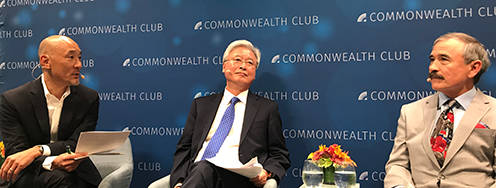Susan Rice on Nuclear Weapons
Susan Rice does not speak very often on nuclear policy, but behind the scenes she played a major role in shaping Barack Obama’s nuclear weapons positions in the 2008 campaign.
Her appointment as national security adviser completes the assembly of a team of Cabinet members, including Secretary of Defense Chuck Hagel and Secretary of State John Kerry, dedicated to reinvigorating President Obama’s nuclear policy efforts and finally giving the nation a posture suited to the demands of this century and no longer shackled to the obsolete policies of the past.
Rice was the head of the national security team for the President's successful 2008 campaign. I was part of the nuclear policy group that reported to her. She, with the help of a number of experts who later joined her in key positions in the administration, including Greg Craig and Ivo Daalder, shaped a tough, visionary nuclear policy for the 21st Century. It was enshrined in the 2008 Democratic Party Platform [PDF] and advocated, among other positions:
A World without Nuclear Weapons
America will seek a world with no nuclear weapons and take concrete actions to move in this direction. We face growing threats of terrorists acquiring nuclear weapons or the means to make them with more countries seeking nuclear weapons, unsecured nuclear materials in many countries, and of the potential spread of nuclear technologies. As George Shultz, Bill Perry, Henry Kissinger and Sam Nunn have warned, current measures are not adequate to address these dangers. We will maintain a strong and reliable deterrent as long as nuclear weapons exist, but America will be safer in a world that is reducing reliance on nuclear weapons and ultimately eliminates all of them. We will make the goal of eliminating nuclear weapons worldwide a central element of U.S.
nuclear weapons policy.End Cold War Nuclear Postures
To enhance our security and help meet our commitments under the Non-Proliferation Treaty, we will seek deep, verifiable reductions in United States and Russian nuclear weapons and work with other nuclear powers to reduce global stockpiles dramatically. We will work with Russia to take as many weapons as possible off Cold War, quick-launch status, and extend key provisions of the START Treaty, including their essential monitoring and verification requirements. We will not develop new nuclear weapons, and will work to create a bipartisan consensus to support ratification of the Comprehensive Nuclear Test Ban Treaty, which will strengthen the NPT and aid international monitoring of nuclear activities.
Ambassador Rice also supported these positions as a core member of the National Security Advisory Group headed by former National Security Advisor Sandy Berger and former Secretary of State Madeleine Albright. I was also a member of this group and help draft its 2007 report, “Reducing Nuclear Threats and Preventing Nuclear Terrorism,” [PDF] endorsed by Rice, that foreshadowed the positions she help develop as part of the campaign the following year.
Other Advisory Group members who endorsed these positions included former Undersecretary of Defense Michele Flournoy, current Deputy Secretary of Defense Ash Carter and Tom Donilon. As I pointed out in an article for The Atlantic defending Secretary of Defense Chuck Hagel’s nuclear policy positions, the group’s report detailed a comprehensive plan for reducing nuclear threats that include the recommendation that "the U.S. and the other NPT nuclear weapons states ... should commit themselves to the goal of a world without nuclear weapons and to pursuing practical steps that would lay the groundwork for moving toward that goal."
The Advisory Group report also called for the rapid Senate approval of the nuclear test-ban treaty; suggested the U.S. "explore means of increasing warning and reaction times including by lowering alert rates of their strategic systems;" and consider "an operationally deployed force of fewer than 1,000 nuclear weapons."
This level is very close to force of 900 total weapons recommended by the Global Zero report that Hagel co-authored with former Vice Chairman of the Joint Chiefs of Staff General James Cartwright, former Supreme Allied Commander General Jack Sheehan, and former Reagan nuclear arms negotiator Richard Burt, among others.
Many had expected Rice to be appointed national security advisor in 2009. When she was chosen as UN ambassador instead, it meant that her nuclear policy work would focus primarily on Iran and North Korea and the strengthening of the nuclear Non-Proliferation Treaty, all major issues before the United Nations.
Now, she will return to Washington with a broader portfolio and will merge with a national security team completely in sync with the policy positions she championed earlier. Her appointment sets the stage perfectly for a major new presidential policy initiative.
All we need is for the lead actor to make his entrance.
Original posting on Huffington Post.



